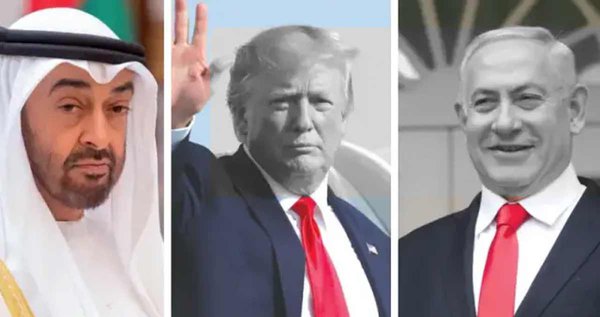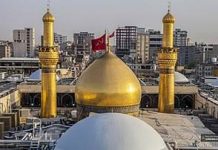By Zainab Ashraf siyasat.net
The middle eastern countries are dividing themselves into two major groups. The deal between the United Arab Emirates (UAE) and Israel revealed this vivid bifurcation. On the one hand, there are countries who are under the pressure of Israel and the United States like Egypt, Jordan and now the UAE has also joined them. The UAE in that case is the third Arab country and the first country from the gulf who has officially signed the peace agreement with Israel. On the other hand, there are counties who are against these collaborations and the collaborators, they are Iran and Iraq. The remaining are in dilemma to choose the side. Though the US President, Donald Trump is really trying hard to pull Bahrain, Oman and Sudan in his team. But unfortunately, Sudan has clearly declined the offer for now. And the remaining are silent spectators like Saudi Arabia. But their silence indicates that they are on the side of the strong team. Now which is that strong team?
The diplomatic friendship between Israel and the UAE put only Israel at the advantageous position. In this deal, the UAE will work together with Israel in its agriculture, defense, medicine, technology and tourism sector. In addition to this, the UAE has also lifted the ban on imports of Israel products on the condition that Israel will now temporarily hold the process of annexation on the west bank of Palestine. Israel has been occupying the land of native Palestinians from 1948 till date.
The temporary hold means that the process of occupation can be resumed in the future. Most of the gulf countries were against this annexation as Palestine is considered the third most sacred site in the Islam after Mecca and Medina. Hence, Arabs-Israelis were in a constant conflict with each other and have fought several wars for Palestine.
The first war was erupted between Israel on one side and Egypt, Transjordan, Syria, Iraq and Saudi Arabia on the other, following the official announcement of the formation of the state of Israel in 1948. The war ended with Israel capturing more territories, including West Jerusalem. Then the UN intervene to sort this out by offering the Partition Plan, originally proposed for a Jewish State. The plan proposed to divide the land in three parts- Arab administered area, Israel administered area and the Independent Palestine.
At that time, the Zionists were ready to accept this plan but the Arabs declined the offer. Later Arab and Israel fought three more wars in 1956, 1967 and 1973. These wars turned out another miserable defeat for Arab countries as Israel succeeded in capturing more territory- the Sinai Peninsula and Gaza Strip from Egypt, East Jerusalem and the West Bank from Jordan and the Golan Heights from Syria.
Finally, with the help of the then US President Jimmy Carter, and the peace treaty was signed between the then President of Egypt, Anwar Sadat and the then Prime Minister of Israel, Menachem Begin in September 1978. As per that treaty , Israel withdrew from Sinai. Following the lead, Jordan also signed a peace agreement with Israel in 1994. At that time also the then US President, Bill Clinton played a pivotal role in bringing two rival countries together and this time as well the US President Donald Trump is maintaining that custom. But in politics no one show this much courtesy without any reason. So, this overt involvement of the President of US is to shape the opinion of general public for 2020 elections.
Moving back to the UAE and Israel deal, well actually nothing has and nothing won’t change on the ground level. Why? Because the UAE and Saudi Arabia were having backroom contacts with Israel from past several years. It’s just that this time the UAE has officially accepted their diplomatic friendship. And the same is true for Saudi Arabia. Its allowance to use its air space for EI AI charter flight carrying the US President Donald Trump’s son-in-law, Kushner shows that Saudi Arabia is now also on the rival side. Though it has not officially accepted this yet.
Therefore, the most affected people by this deal are the Palestinians only. Even the Israel Prime Minister Benjamin Netanyahu said, “Who would have ever dreamed there would be a peace agreement with an Arab country without our returning to the 1967 borders?” They felt as if they have been stabbed in their back by their own friends. And on their behalf, Iran is speaking against this deal. The President of Iran, Hassan Rouhani condemned the deal in his tweet and label it as a “betrayal of the Palestinian cause” and the UAE had made a “huge mistake”. In addition to this in his Tuesday speech he said, “Of course, the UAE’s betrayal will not last long, but this stigma will always be remembered. They allowed the Zionist regime to enter the region and forgot Palestine. The Emiratis will be disgraced forever… I hope they wake up and compensate for what they did.” The motive of Israel is to divide the Gulf countries into Shia and Sunni and this is what exactly happening over there.
In the midst of all this political hurl, no one remembers the Palestinians. And the irony is, the decisions are being made of their land without even consulting them.
(www.siyasat.net is Ahmedabad,Gujarat,India based website)
(The author is studying masters in Development Communication at Jamia Millia Islamia)

































